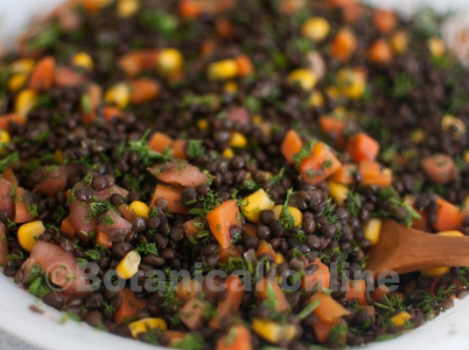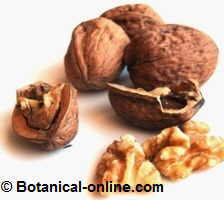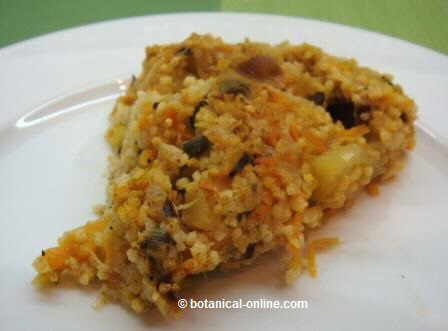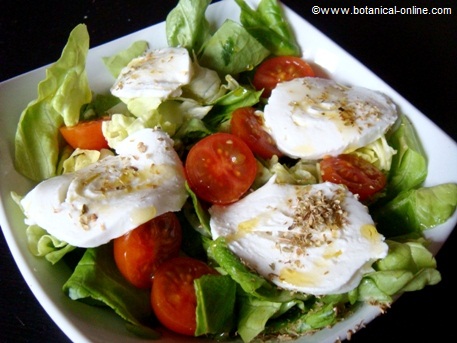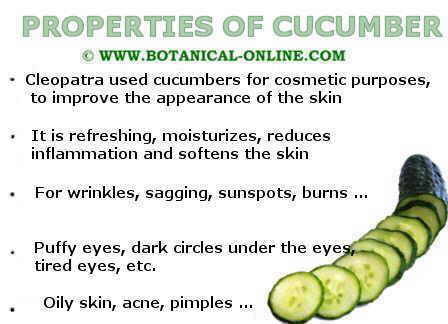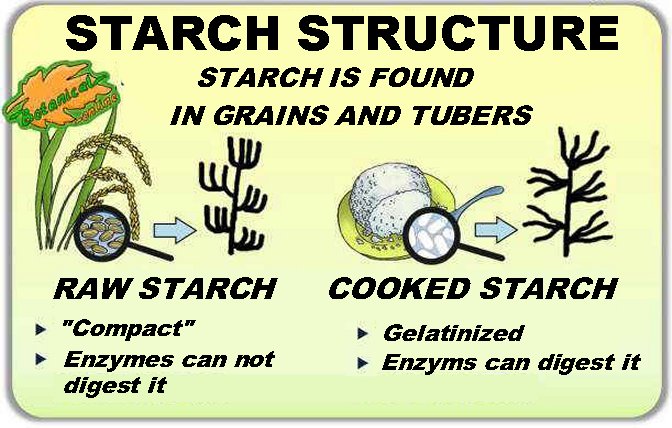Contents
- 1 Suitable diet for pregnancy
- 1.1 Adequate food for pregnancy
- 1.2 Tips for changes in pregnancy
- 1.3 How much weight should be gained during pregnancy?
- 1.4 RECOMMENDED AND NOT RECOMMENDED FOOD FOR PREGNANCY
- 1.5 Foods rich in omega-3 during pregnancy
- 1.6 Diet rich in folic acid during pregnancy
- 1.7 Protein-rich foods during pregnancy
- 1.8 Other recommended foods for pregnancy
Suitable diet for pregnancy
Adequate food for pregnancy
How to eat so that food can be healthy for both, you and your baby? In pregnancy, eating is an act of sharing in the broadest sense of the word.
Photo of lentil salad, a suitable recipe for pregnancy |
Diet during pregnancy should allow the good health of the mother and the growth and health of the baby.
In addition, a set of guidelines can be recommended to minimize discomfort related to food that can occur at this stage, such as nausea, tooth decay or constipation.
It is also important to say that most teas and medicinal plants are contraindicated in pregnancy, so many home remedies are inadequate. In these cases it is always recommended to consult a doctor.
Tips for changes in pregnancy
Among the various changes that can occur during pregnancy, we have some disorders such as:
- Nausea and vomiting: These may hinder proper nutrition. To avoid these problems soft cooking without too many seasonings are recommended: boiled, steamed, soups,… Avoid fried or grilled foods, and intense flavors.
- Caries in pregnancy: Produced by hormonal changes or vomiting. Pregnant women should maintain strict dental hygiene to avoid these problems. A protective food: cheese helps prevent cavities.
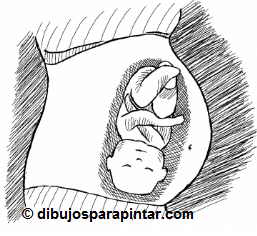 Drawing, courtesy of © Dibujosparapintar.com Drawing, courtesy of © Dibujosparapintar.com |
- Constipation is normal: the body decreases bowel movements for greater absorption of nutrients.
- Eating for Two: Because absorption increases it is not necessary for the pregnant to “eat for two”, but she needs to eat very nutritious foods.
- Pregnancy cravings: It is a false belief that pregnant woman have a craving for what they need. They should not usually eat much processed trans fat or refined sugar products, which are nothing beneficial (pastries, cookies, snacks, fried industrial, etc.).
- Diabetes in pregnancy: It will be important to control blood glucose and the elimination of refined industrial products rich in sugar or high-fat (jams, pastries, cookies, chocolate,…). Instead we recommend: avocado, low sugar fruits such as citrus, sandwiches, toasts, oats porridge,…
- Stretch marks in pregnancy: A very popular remedy used is a daily gentle massage with rosehip oil.
* Remedies for heartburn and constipation in pregnancy
* Natural cosmetics in pregnancy
How much weight should be gained during pregnancy?
During pregnancy weight should be increased from 9 to 12kg. Normally this weight gain occurs as follows:
– During 1st trimester 0.5 to 1 kg
– During 2nd trimester from 3.5 to 4 kg
– 3rd trimester 5 to 6 kg
– Weight loss in pregnancy: Do not perform strict diets during pregnancy. a healthy diet that provides enough calories for mother and baby is recommended. (Consult a dietitian)
RECOMMENDED AND NOT RECOMMENDED FOOD FOR PREGNANCY
Foods rich in omega-3 during pregnancy
It is recommended to eat seven walnuts each day |
- Omega 3: This is the most recommended type of fat because it improves cardiovascular health (blood volume and heart rate increases during pregnancy) and prevents postpartum depression (especially DHA fats).
- Walnuts: They are the foods rich in omega 3 and omega 6. With 7 walnuts a day is enough to meet these needs.
- Blue Fish: It’s a food to be considered as it is the only one that provides lots of EPA and DHA fatty acids, important for the development of the fetal nervous system. A serving of fish provides more EPA and DHA than any nutritional supplement.
The small oily fish (sardines, mackerel,…) is recommended. Not to cook at too high temperatures, which would impair their omega 3. Vegetarian women can get omega 3 from walnuts and ground chia seeds (2 teaspoons daily).
- Avocado: It provides a lot of healthy fats. It is also a very valuable food for pregnant women because of its enormous folic acid content. You can eat homemade guacamole sauce, add avocado to salads, sandwiches, etc.
- Olive oil: For seasoning and cooking, for its good balance of fats containing omega 3, omega 6 and omega 9. The recommended is the extra virgin, which contains a lot of vitamin E.
- Sunflower oil: For salad dressings (always use raw) for its high proportion of essential fatty acids. It must be cold-pressed and unrefined.
Diet rich in folic acid during pregnancy
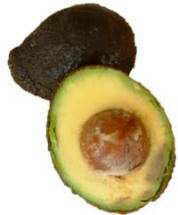 Avocado is very rich in folic acid Avocado is very rich in folic acid |
- Foods rich in folic acid: Folic acid is one of the most important vitamins for both the conception and development of the baby.
Involved in the multiplication of cells, it is essential for the correct course of pregnancy. Folic acid deficiency can cause spina bifida in the unborn baby.
It is difficult for this deficiency occur if enough vegetables (especially green leafy vegetables), legumes and fruits during pregnancy are ingested.
Folic acid needs are stablished 400 mcg. in a balanced diet, 600 mcg. during pregnancy and 500 mg. during breastfeeding.
This vitamin is also important when the child grows, between 3 and 12 years, and during youth, reason why it is recommended that children eat vegetables.
Foods rich in folic acid are:
| List of foods rich in folic acid per serving expressed in micrograms (mcg) | |
|---|---|
| 1 bowl of boiled spinach | 260 |
| 100gr of garbanzo beans, peas or lentils | 180 |
| Half avocado (150g) | 120 |
| 1 large potato, boiled | 114 |
| 1 cup rolled oats | 90 |
| 1 orange juice | 74 |
| 1 mango or a serving of forest fruits | 70 |
| Lightly toasted sunflower seeds (2 tablespoons) | 70 |
| 1 orange, ration strawberry or papaya | 55 |
| 1 handful of nuts (walnuts, hazelnuts, almonds, pistachios, etc.) | 30 |
| 5g wheatgerm | 25 |
* Related Information: Recipes rich in folic acid
Sheet summary of the recommended diet during pregnancy.
Protein-rich foods during pregnancy
– Foods rich in protein: Protein needs to be increased progressively during pregnancy. Approximately one should take between 0.8 to 1 g. of protein per kilo of weight. For example, a 70 Kg. Should take between 56g. and 70 grams of protein per day (70 Kg. x 0.8 g. / kg. = 56 g. of protein).
In the third trimester of pregnancy protein needs increase +20 g. of protein a day, which can be translated into an extra serving of meat, fish or 2 eggs. Similarly, throughout pregnancy, protein foods should be consumed, and spread during the day, in the following way:
- 1 plate of vegetables (= 20 grams of protein)
- 2 eggs (= 15 g protein.)
- A handful of almonds, 12 units (= 5 g of protein.)
– If you take milk:
- 2 yoghurts (= 10g protein.): Choose low-fat if overweight.
- A glass of milk (= 7 g. Of protein)
- 40 g. cured cheese (= 15 g. of protein)
- 75 g. fresh cheese (= 10 g. protein)
– In non-vegetarian diets:
- 150 g. fish or white meat (= 20-25 g. protein)
* Related Information: How to calculate protein intake
Other recommended foods for pregnancy
 Carrot is rich in beta carotene, pro-vitamin A Carrot is rich in beta carotene, pro-vitamin A |
Other plant foods that provide beta-carotene, vitamin C and components that improve health are:
- Carrots: They provide a lot of beta-carotene, which the body converts into vitamin A. This vitamin helps in the formation of the fetus and improves skin condition, prevents stretch marks and improves overall health of the body. It is very interesting contribution of vitamin A as beta carotene during pregnancy. (Eat at least 3 carrots daily)
A preparation is very suitable grated carrot with squeezed lemon and virgin olive oil.
Beta carotene resist cooking and are also found in the cream of carrot and pumpkin cream.
- Leafy greens: For its high content in folic acid, they are essential: spinach, asparagus, artichokes, beets, chard, arugula, okra, chayote, Brussels sprouts, etc.
– Citrus: They are rich in vitamin C, folic acid and calcium (oranges, tangerines, etc.).
- Nuts: They are a source of minerals and calcium.
- Pineapple, papaya and kiwi: They contain enzymes that help break up food and improve digestion.
- Ginger: Ginger Infusions are suitable to treat nausea and vomiting if there is no contraindication. (Consult your doctor)
*Keep reading:
Pregnant women can meet their nutritional requirements and what foods are more desirable referring to page:
– Needs of vitamins and minerals during pregnancy and lactation
– Menu for pregnancy
* Other items of interest:
![]() More information on pregnancy care.
More information on pregnancy care.

